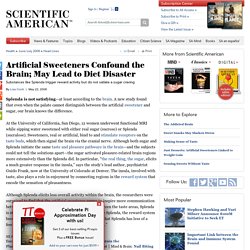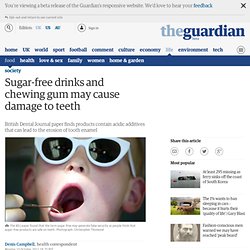

Michael Pollan: Food Rules for Healthy People and Planet. Sugar: The Bitter Truth Artificial Sweeteners Confound the Brain; May Lead to Diet Disaster. Splenda is not satisfying—at least according to the brain.

A new study found that even when the palate cannot distinguish between the artificial sweetener and sugar, our brain knows the difference. At the University of California, San Diego, 12 women underwent functional MRI while sipping water sweetened with either real sugar (sucrose) or Splenda (sucralose). Sweeteners, real or artificial, bind to and stimulate receptors on the taste buds, which then signal the brain via the cranial nerve. Although both sugar and Splenda initiate the same taste and pleasure pathways in the brain—and the subjects could not tell the solutions apart—the sugar activated pleasure-related brain regions more extensively than the Splenda did. In particular, “the real thing, the sugar, elicits a much greater response in the insula,” says the study’s lead author, psychiatrist Guido Frank, now at the University of Colorado at Denver.
This story was originally printed with the title, "Faux Sugar: Bittersweet" Sugar-free drinks and chewing gum may cause damage to teeth. Sugar-free gum, sweets and soft drinks, marketed as healthy alternatives to sugary products, can damage teeth, cause gastric problems and are unlikely to promote weight loss, research claims.

A study review in the British Dental Journal (BDJ) found that sugar-free foods and drinks contain acidic additives that may cause dental problems by eroding the enamel on consumers' teeth. Disclosure of what the authors call a "hidden risk" could affect sales of sugar-free products, especially given what the paper describes as consumers' blind confidence in such products as a good thing. The paper, Are sugar-free confections really beneficial for dental health? , examined the role of sugar substitutes used in products to reduce the risk of tooth decay. While one commonly used group of substitutes, called sugar alcohols, or polyols, do lessen the risk of cavities, they can cause acidity in the mouth that then leads to erosion of teeth enamel, says the paper.
The difference between fructose and glucose: it's not all in your mind. Preserving Cabrini-Green's images In the sharp sun of an April afternoon, Nate Lanthrum walks through the remains of Cabrini-Green giving away what he has taken.

He looks out of place, a white guy carrying a $1,500 Nikon D700 camera, but the residents are used to him by now and greet... Blackhawks thrilled to have Brent Seabrook back Starting with Game 6 Sunday, Brent Seabrook's timeout will be over and the defenseman will be back on the ice — so long as he promises to play nice. The Blackhawks have done pretty well in Seabrook's absence, winning all three games the NHL...
NFL draft preview: Defensive ends As the NFL draft nears — it takes place May 8-10 — we're taking an 11-day, position-by-position look at what's out there and what the Bears need. In May 1974, Tribune delivered 2 Watergate bombshells Obama denounces racist comments reportedly made by NBA owner Cubs can't take advantage of Brewers' injuries Northwestern women win at Wrigley Blackhawks thrilled to have Brent Seabrook back. What Eating Too Much Sugar Does to Your Brain. Overeating, poor memory formation, learning disorders, depression—all have been linked in recent research to the over-consumption of sugar.

And these linkages point to a problem that is only beginning to be better understood: what our chronic intake of added sugar is doing to our brains. According to the U.S. Department of Agriculture (USDA) , the average American consumes 156 pounds of added sugar per year. That's five grocery store shelves loaded with 30 or so one pound bags of sugar each. If you find that hard to believe, that's probably because sugar is so ubiquitous in our diets that most of us have no idea how much we're consuming.
The key word in all of the stats is "added. " That's an important clarification because our brains need sugar every day to function.